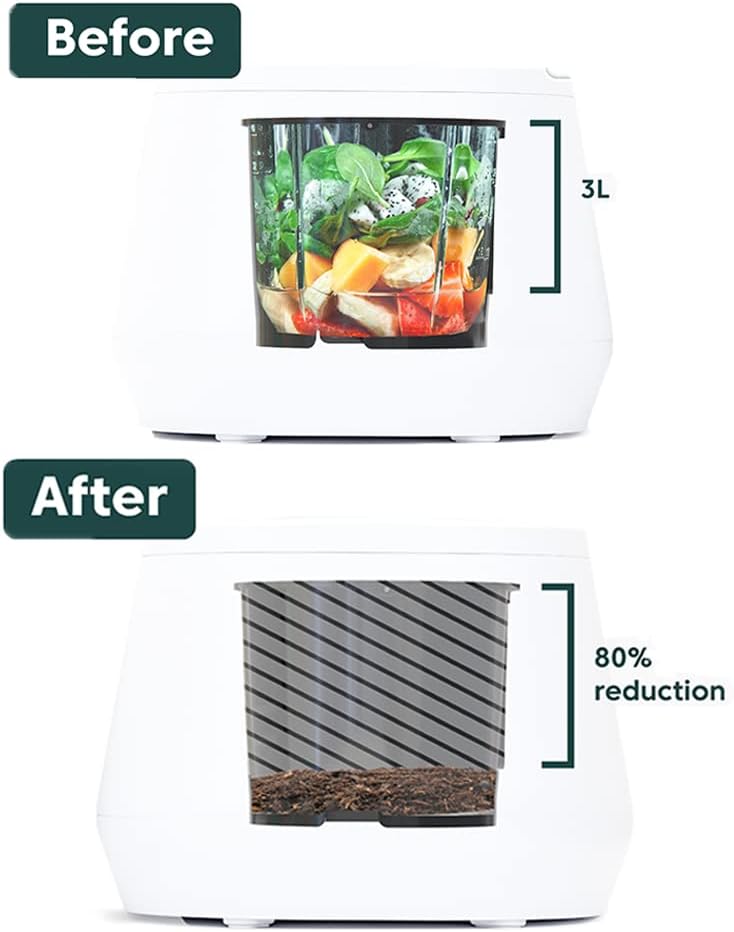In a world where sustainability and innovation are at the forefront of societal progress, the development of the world’s first smart waste electric composter represents a significant leap forward. This technological marvel not only addresses the pressing issue of waste management but also integrates advanced features to enhance efficiency, user convenience, and environmental impact. Let’s delve into the intricacies of this groundbreaking invention, exploring its features, benefits, and potential to transform our approach to waste disposal.
The Genesis of Smart Composting
Traditional composting has long been recognized as an effective method of recycling organic waste into valuable fertilizer. However, the process can be labor-intensive, time-consuming, and limited by environmental conditions. Enter the smart waste electric composter, a device that automates and optimizes the composting process, making it accessible and practical for households and businesses alike.

Key Features of the Smart Waste Electric Composter
- Automated Composting Process: The core feature of the smart composter is its ability to automate the entire composting process. Sensors and algorithms work together to monitor and adjust temperature, moisture levels, and aeration, ensuring optimal conditions for composting. This eliminates the need for manual intervention and reduces the time required to produce compost.
- Smart Sensors and IoT Integration: Equipped with state-of-the-art sensors, the composter continuously monitors various parameters. Internet of Things (IoT) integration allows users to track the composting process remotely via a smartphone app. This connectivity provides real-time updates, alerts, and the ability to adjust settings from anywhere, enhancing user convenience.
- Energy Efficiency: The electric composter is designed with energy efficiency in mind. It utilizes advanced energy management systems to minimize power consumption while maintaining optimal composting conditions. Some models even incorporate renewable energy sources, such as solar panels, to further reduce their environmental footprint.
- Odor Control: One of the common challenges with composting is managing odors. The smart composter employs advanced odor control mechanisms, including activated carbon filters and biofilters, to neutralize unpleasant smells. This makes it suitable for indoor use, a significant advantage for urban dwellers.
- User-Friendly Interface: The user interface is simple to use and intuitive. Whether accessed through a touch screen on the device or a mobile app, users can easily manage the composting process, view progress reports, and receive maintenance reminders. This user-centric design ensures that anyone can operate the composter with minimal training.
Environmental and Economic Benefits
- Reduction of Landfill Waste: By diverting organic waste from landfills, the smart composter significantly reduces the volume of waste that contributes to landfill overloading and methane emissions. This directly contributes to lowering greenhouse gas emissions and mitigating climate change.
- Production of High-Quality Compost: The compost produced by the smart composter is rich in nutrients and free from contaminants, making it ideal for gardening and agriculture. This high-quality compost can improve soil health, boost growth of plants and lessen the requirement for chemical fertilizers, promoting sustainable agricultural practices.
- Cost Savings: For businesses and households, the smart composter can lead to substantial cost savings. By reducing the need for waste collection and disposal services, users can lower their waste management expenses. Additionally, the production of free, high-quality compost reduces the need to purchase commercial fertilizers.
- Education and Awareness: The adoption of smart composters can be used as a teaching tool to bring attention to waste management and environmental sustainability. Schools, community centers, and businesses can use these devices to demonstrate the importance of composting and inspire eco-friendly practices.
Case Studies and Real-World Applications
- Urban Settings: In densely populated urban areas, managing organic waste can be challenging. Smart composters offer a practical solution for apartment buildings, restaurants, and community gardens. Several pilot programs in cities like New York and Tokyo have demonstrated the effectiveness of smart composters in reducing waste and producing valuable compost for urban green spaces.
- Agricultural Communities: In rural and agricultural communities, smart composters can support sustainable farming practices. Farmers can use the compost to enrich their soil, enhance crop yields, and reduce dependence on chemical fertilizers. Case studies from agricultural regions in Europe and North America highlight the positive impact of smart composters on farm productivity and environmental health.
- Educational Institutions: Schools and universities are increasingly incorporating smart composters into their sustainability initiatives. These institutions use the devices as educational tools to teach students about the composting process, waste reduction, and environmental stewardship. Success stories from campuses across the globe underscore the role of smart composters in fostering a culture of sustainability.
Challenges and Future Prospects
While the world’s first smart waste electric composter represents a significant advancement, it is not without challenges. The initial cost of the device may be a barrier for some users, and ongoing maintenance is required to ensure optimal performance. However, as technology advances and economies of scale are realized, it is expected that the cost will decrease, making smart composters more accessible to a broader audience.
Looking ahead, the future of smart composting is promising. Continuous innovation in sensor technology, AI, and Integration of renewable energy will improve the capabilities and effectiveness of smart composters. Collaboration between technology companies, environmental organizations, and governments will be crucial in promoting widespread adoption and maximizing the environmental benefits of this groundbreaking invention.
conclusion:
The world’s first smart waste electric composter is a testament to human ingenuity and our commitment to sustainability. By revolutionizing the composting process, this innovative device addresses the critical issue of waste management, reduces environmental impact, and promotes eco-friendly practices. As we move towards a more sustainable future, the smart composter stands as a beacon of hope, demonstrating that technology can be harnessed to make the world more sustainable, greener, and cleaner for all.
If you want to buy the Silicone Snack Platter Cup, see our blog:
Silicone Snack Platter Cup: Elevate Your Snack Game!

